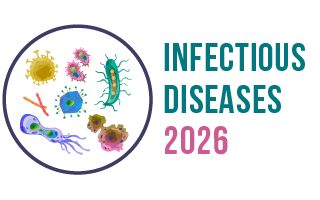4th International Conference on
Infectious Diseases
September 09-10, 2026 | Barcelona, Spain

Infectious Diseases 2026

Hassan II University, Morocco
Abstract:
Severe acute respiratory syndrome coronavirus 2 (SARS-CoV-2) induces pneumonia and acute respiratory failure in coronavirus disease 2019 (COVID-19) patients with inborn errors of immunity to type I interferon (IFN-I). The impact of SARS-CoV-2 infection varies widely, ranging from mild respiratory symptoms to life-threatening illness and organ failure, with a higher incidence in men than in women. Approximately 3–5% of critical COVID-19 patients under 60 and a smaller percentage of elderly patients exhibit genetic defects in IFN-I production, including X-chromosome-linked TLR7 and autosomal TLR3 deficiencies. Around 15–20% of cases over 70 years old, and a smaller percentage of younger patients, present with preexisting autoantibodies neutralizing type I interferons. We aims to present recent evidence from the scientific literature on genetic and immunological abnormalities predisposing individuals to critical SARS-CoV-2 infection through IFN-I. Understanding the immunological mechanisms and pathogenesis of severe COVID-19 may inform personalized patient care and population protection strategies against future serious viral infections.
Biography:
Kholaiq Halima is currently a PhD student at the Laboratory of Clinical Immunology, Inflammation, and Allergies, Faculty of Medicine and Pharmacy, Hassan II University, Casablanca, Morocco. She has a keen interest in respiratory viruses such as influenza, coronavirus, parainfluenza, and respiratory syncytial virus. Her research also focuses on interferons (IFNs), autoantibodies, and multisystemic inflammatory syndrome. Halima is passionate about studying the interactions between viruses and host cells.
